IAVA | November 1, 2021
READ: Over 100 NGOs Have Written a Joint Letter to National Security Advisor Jake Sullivan on At-Risk Afghans Who Remain in Afghanistan
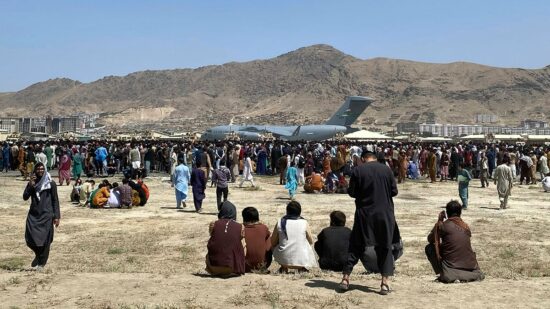
Jake Sullivan
National Security Advisor
White House National Security Council
1650 Pennsylvania Avenue NW
Washington, D.C. 20502
Dear Mr. Sullivan:
We, the undersigned leaders of 103 non-governmental organizations in the international development, humanitarian, peacebuilding, refugee, immigration and resettlement, and veterans affairs sectors, write to express our alarm at the estimated tens of thousands of at-risk Afghans who were left behind after the August 31 U.S. military withdrawal from Afghanistan. These individuals played key roles in efforts to strengthen Afghanistan’s government, judiciary, civil society, and media and to protect human rights. For their work, many now face the threat of violent retaliation at the hands of de-facto authorities. Given the urgency of this matter, our community respectfully requests a CEO or Executive-level meeting with you to voice our concerns and hear the Administration’s plans to evacuate and resettle at-risk Afghans who remain in Afghanistan.
We call on the Biden Administration to prioritize their safe evacuation before it is too late. Some of these individuals assisted U.S. and allied armed forces. Others worked for or alongside U.S.-based and funded organizations to secure women’s rights, establish a free press, or provide desperately needed humanitarian assistance to their countrymen and women. All are now bound by their shared fear for their safety. If the White House does not move to evacuate them with haste, it will leave an indelible stain on this Administration’s stated commitment to a foreign policy centered on human rights and its repeated commitments to support at-risk Afghans.
We are disappointed by the Biden Administration’s overly narrow list of priority stakeholders for evacuation, which currently includes only: American citizens, legal permanent residents (LPRs), immediate family members of American citizens and LPRs, U.S. Embassy staff, and Special Immigrant Visa (SIV) applicants with Chief-of-Mission approval. While these individuals are undoubtedly deserving of U.S. evacuation support, thousands of other Afghans face an immediate need for protection due to their affiliation with the U.S. Government. The failure to prioritize them as well imperils their lives.
We are particularly keen to hear the Administration’s plan to systematically process at-risk Afghans that fall outside of the scope of the SIV program, who have been consistently under-addressed over the past several months. We are especially concerned for those Afghans referred by employers to the P-2 designation of the U.S. Refugee Admissions Program (USRAP). The evacuation of these individuals should be seen as no less significant than any other priority evacuees given their work advancing democracy, human rights, and human dignity, and level of risk.
The FY 2022 Continuing Resolution requires the Biden Administration to create a strategy and status on Afghan evacuee resettlement, as well as the Afghan Priority-2 (P-2) program, and to create a plan for augmenting personnel needed for refugee processing or humanitarian parole. Below please find critical recommendations to expedite the evacuation and processing of at-risk Afghans for your consideration. These measures, if promptly taken, would make important strides towards restoring viable pathways to safety for at-risk Afghans and their families. We urge the Biden Administration to:
- Establish a unified U.S. Government coordinating group for overseas operations to facilitate greater inter-agency coordination and more expeditiously communicate updates to our community. This group should include, at a minimum, the U.S. Departments of State, Homeland Security, Defense, Treasury, and the U.S. Agency for International Development.
- Create a humanitarian parole program for Afghan nationals, at minimum for Afghans with U.S. ties or loved ones already in the United States. The U.S. should provide and process filed applications for humanitarian parole and documentation allowing these individuals to travel to the U.S. Waive any fees associated with requesting and applying for humanitarian parole for Afghan nationals.
- Provide travel documents, diplomatic notes, letters of support, or other relevant materials to allow at-risk Afghans to exit Afghanistan and enter “lilypad” countries for processing, and create a mechanism for Afghans in other host countries to enter “lilypads” for processing to the U.S. Many at-risk Afghans do not have valid passports or visas, and the Taliban recently stated they would not allow Afghans to cross the border into third-countries without documentation. As the U.S. government does not currently maintain a diplomatic presence inside Afghanistan, these at-risk Afghans are unable to secure the required documentation. The U.S. must use diplomacy to negotiate safe passage into “lilypad” countries and then onward to U.S. military bases for processing.
- Surge resources and personnel to “lilypad” countries, particularly those with U.S. military installations, to scale up and expediently process applications. The U.S. Government must press neighboring countries to open their borders to fleeing Afghan refugees. The U.S. Government must incentivize third countries to provide space, housing, and aid for meeting fleeing Afghans’ basic needs during the requisite processing period.
- Provide virtual and expedited screening and processing for all at-risk Afghans, including those who have applied for the SIV, humanitarian parole, and family reunification (such as follow-to-join/I-730) programs, as well as those who are referred to USRAP, including P-1, P-2, and P-3 referrals while in Afghanistan or host countries.
- Identify additional pathways to safety for at-risk Afghans who do not qualify for the SIV or the USRAP P-2 program. This includes, but is not limited to, individuals who do not have a verifiable U.S. affiliation and are not known to the U.S. Embassy but who were engaged in activities that make them targets of Taliban reprisals. Such individuals include civil servants, women’s rights advocates, election workers, human rights lawyers, academics, and journalists. We strongly recommend including individuals who worked on U.S.-funded sub-contracts or sub grants as well.
While Afghanistan sinks into a grave humanitarian crisis, credible reports from international human rights monitors, media organizations, and multilateral bodies indicate that the Taliban is targeting Afghans, including those who have worked with U.S. and allied armed forces and women’s rights activists, with retaliatory killings and violence. If the U.S. does not bring these vulnerable Afghans to safety, it will have failed to uphold its commitment to human rights and turned its back on the very causes of human dignity and freedom it claims to uphold.
The Administration must act now. We look forward to discussing these recommendations with you in the proposed CEO- or Executive-level meeting.
Signed,
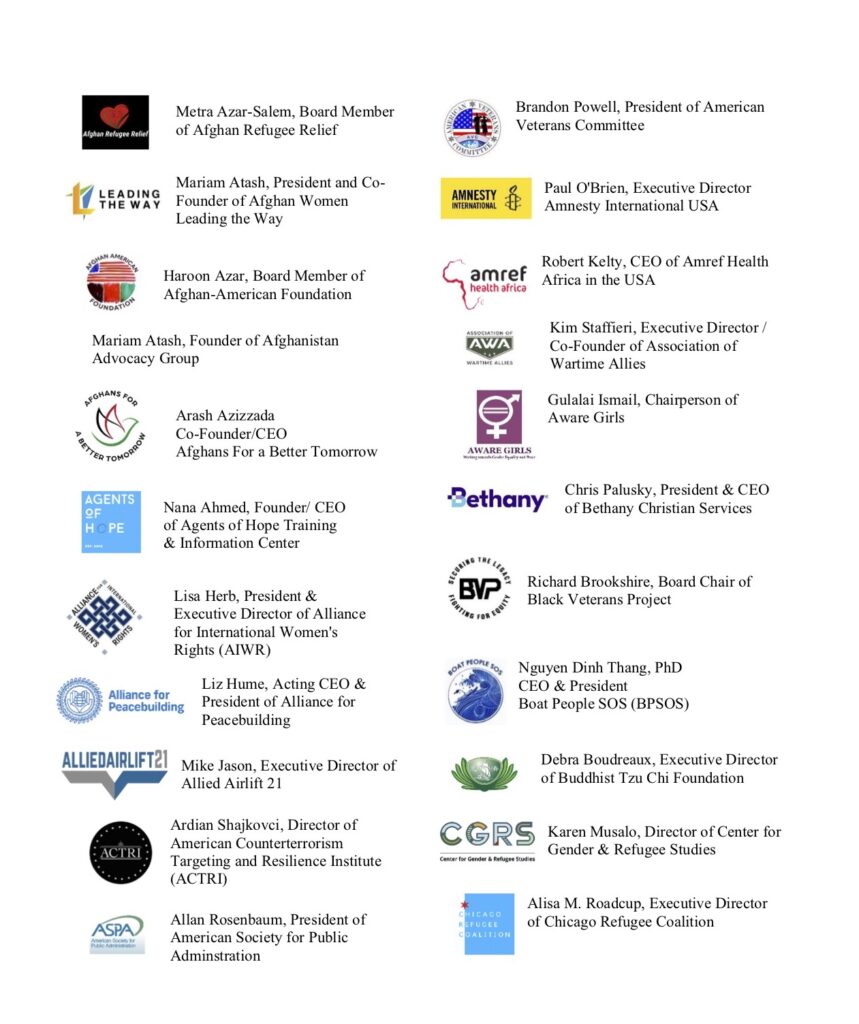
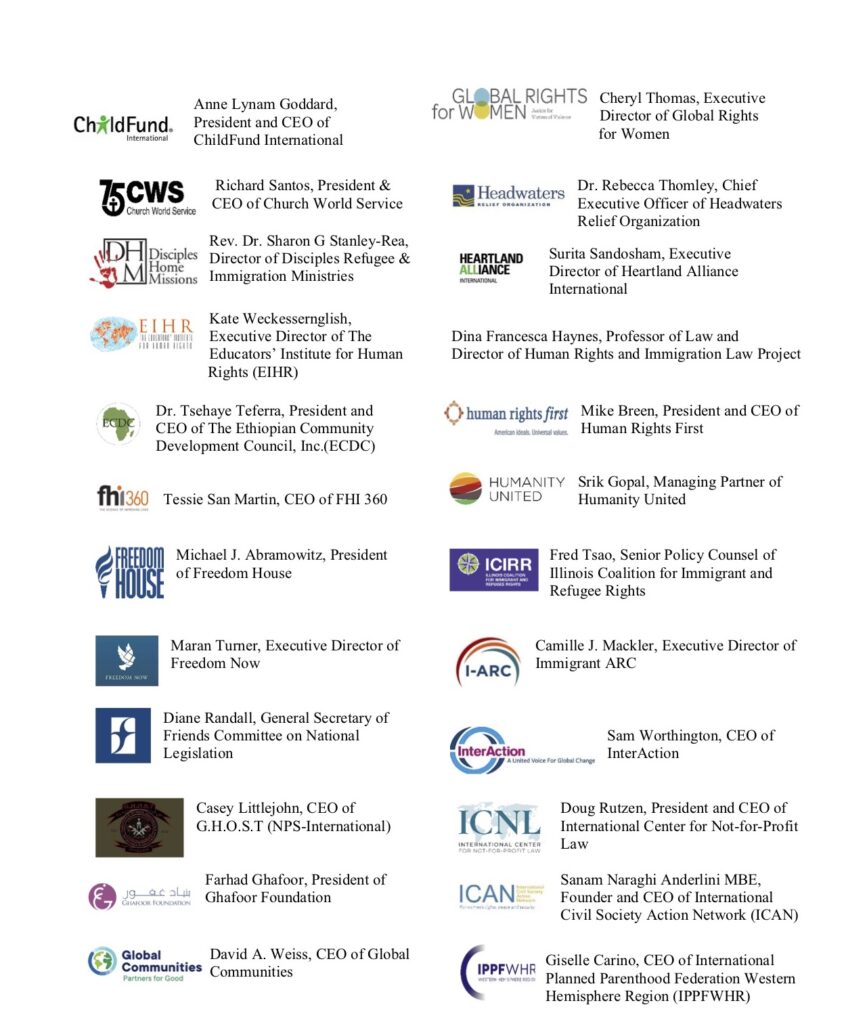
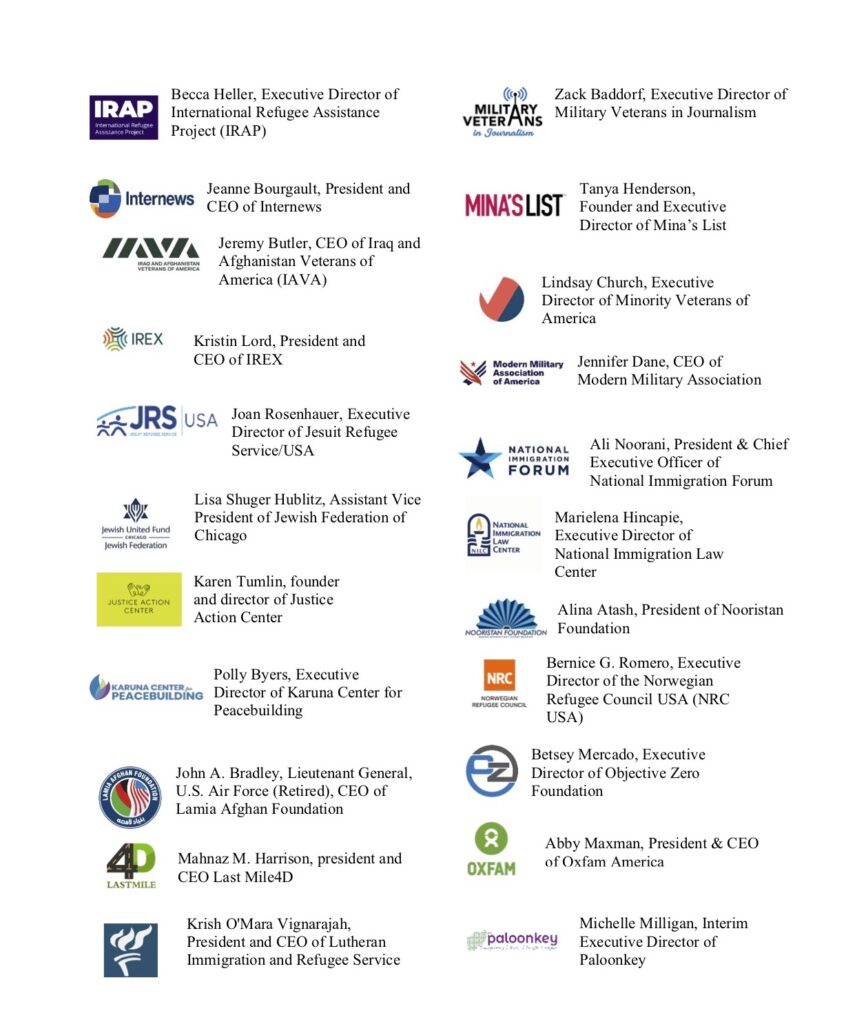
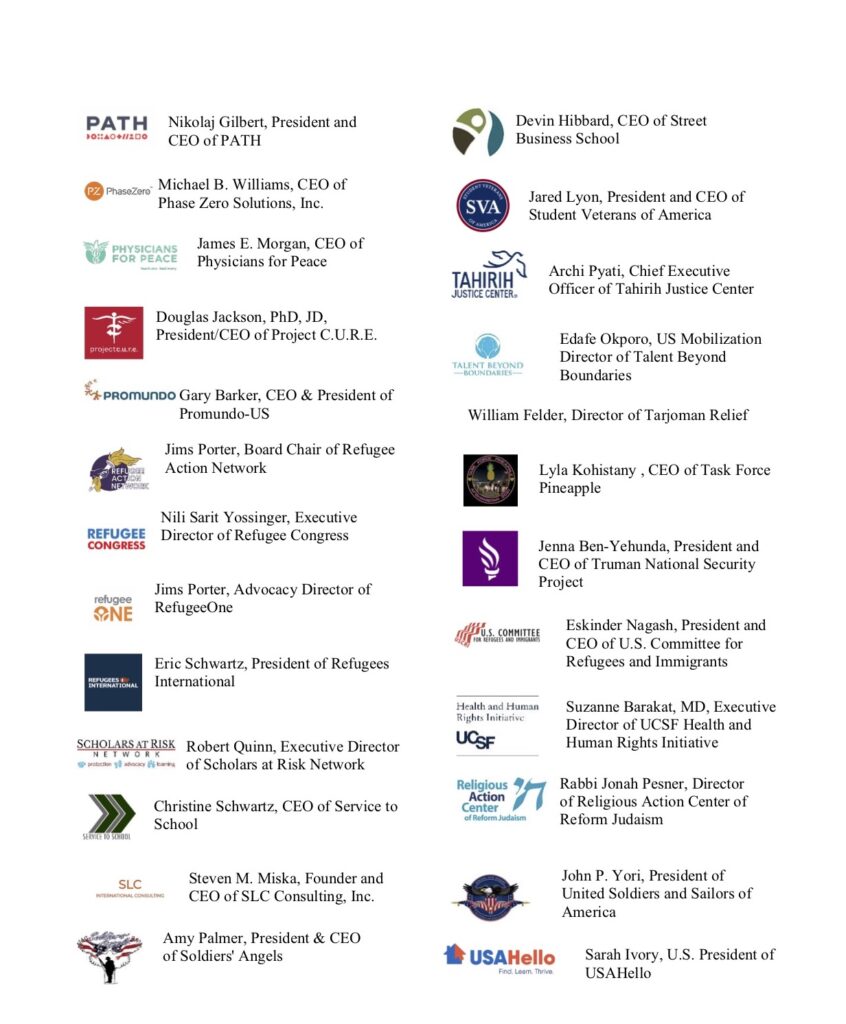
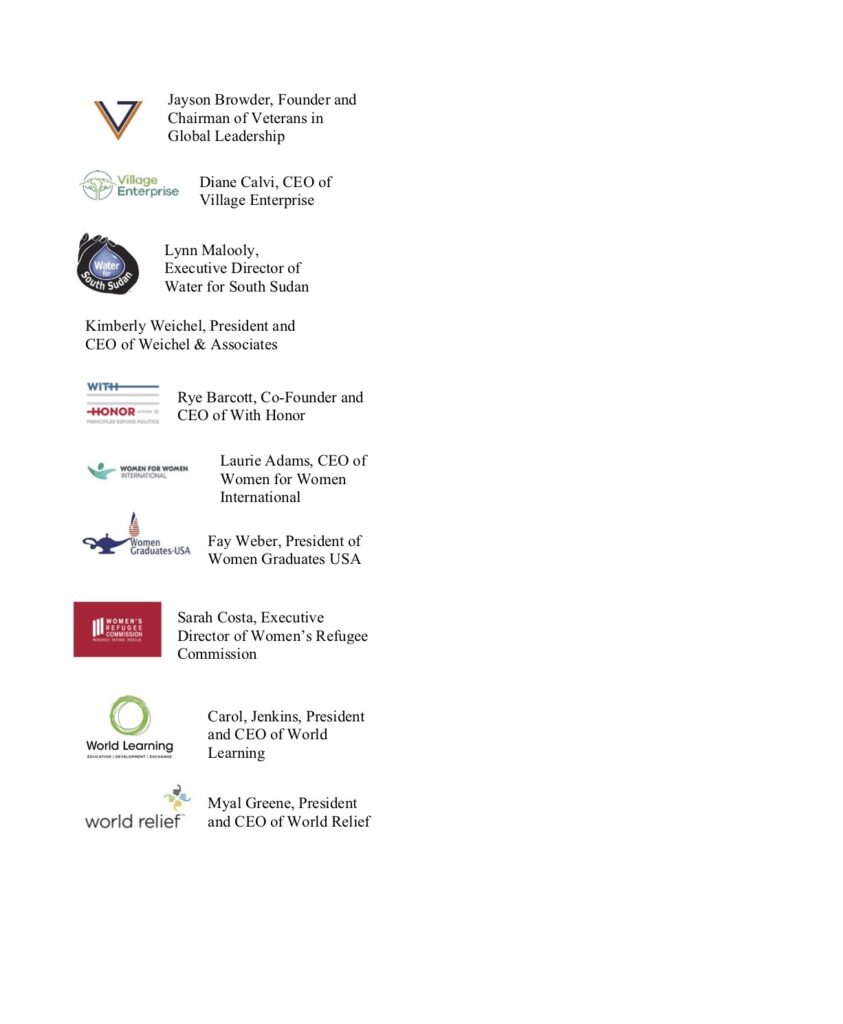
CC:
Anthony Blinken
Secretary of State
U.S. Department of State
Ambassador A. Elizabeth Jones
Coordinator for Afghan Relocation Efforts
U.S. Department of State
Uzra Zeya
Under Secretary of State for Civilian Security,
Democracy, and Human Rights
U.S. Department of State
Alejandro Mayorkas
Secretary of Homeland Security
U.S. Department of Homeland Security
Lloyd Austin
Secretary of Defense
U.S. Department of Defense
Samantha Power
Administrator
U.S. Agency for International Development





